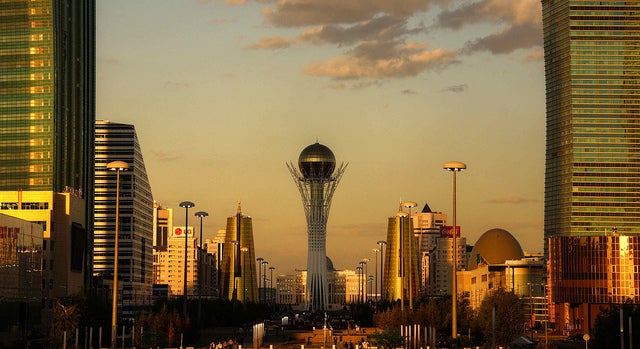
Kazakhstan. Photo: Jyoti Bisbey
I was in Astana on mission to launch the new technical assistance program for Kazakhstan’s PPP policy reform, which addresses bottlenecks that constrain project structuring. This reform is especially important if the country’s Almaty Ring Road PPP is to be effective. Almaty Ring Road has been a thought-provoking transaction because previous attempts to solidify the partnership have not panned out, and grasping the history is important to resolving this successfully. Moazzam Mekam, IFC’s Regional Manager for Central Asia, and I spent many hours brainstorming on scenarios that would allow us to bring all of the stakeholders into agreement. Most of the time, it felt like we were trying to pull a rabbit out of a hat.
The Almaty Ring Road is Kazakhstan’s only PPP in preparation right now, and it’s in the spotlight during its prequalification stage. The advisory services are provided by IFC; three years of project preparation have been devoted to ensuring that this is the right project to take to market as a PPP. As the World Bank Group continues to support Kazakhstan on bringing private sector participation into the delivery of public infrastructure services, the reality is that since the 2006 Concession Law, not one PPP project has transpired. Before the Concession Law, there were three PPP projects, but all of them have had issues.
As I resumed one of my sunrise runs in this very flat, picturesque, futuristic city, I recalled a recent conversation with Moazzam. He made the point that even when there is a high level of political support for PPPs in the country, institutional and regulatory frameworks are sometimes not ready for PPPs. Capacity and willingness to undertake PPPs at the line ministry/agency level is limited. In instances like this, or when conditions exist in a similar context, we must ask ourselves how to respond, and how to move forward.

Photo: mariusz kluzniak/flickr
Of course there is neither a panacea, nor a perfect formula to get it right. Every government, sub-national or national, has its own forces at play. Our job is to understand those forces well enough to evaluate the appropriateness of a PPP, and then, if it’s decided that the environment is right for this sort of partnership, to structure an effective PPP.
I’ve learned over time that each PPP is different, and solutions must be tailored to very specific conditions. The waste sector in Brazil can’t use the same PPP that worked for the waste sector in Colombia; a light rail PPP that transformed one city in India would fall apart in another Indian city.
As a starting point, we believe that it make a difference if all IFIs join hands together on the main actions needed to reform Kazakhstan’s PPP agenda. That’s why I am working with Moazzam’s team to provide technical assistance on screening and preparation of projects.
Our emphasis is on convening all the stakeholders in the PPP space – such as the European Bank for Reconstruction and Development, the Asian Development Bank, and the United Nations Economic Commission for Europe – making it possible to reach a common understanding. Then we will be equipped to work with the government to present a unified voice on what needs to be done. Our plan is to identify two to three key ‘deal breakers’ which absolutely have to be addressed in order to move the projects forward. This will send a strong signal to the market that Kazakhstan is open for business.
In Kazakhstan – and around the globe – our challenge is not to do one PPP transaction every four or five years, but to do a portfolio of properly vetted PPP transactions every year. This requires a greater level of understanding and commitment around PPPs than currently exists in many of the countries we serve. As we join forces internally to reach this goal, we envision a different way of helping governments succeed in delivering infrastructure services in the long term, with more rapid progress between the time that advice is offered and when a project comes to fruition.
How can we better incentivize governments to act upon the advice they seek? This is, of course, a challenge we all share. We’re open to hearing your suggestions on how we can collaborate even more effectively, ultimately helping to shift policies that will affect positive change on the ground.
Special thanks to Moazzam Mekan for his contributions to this piece


Join the Conversation